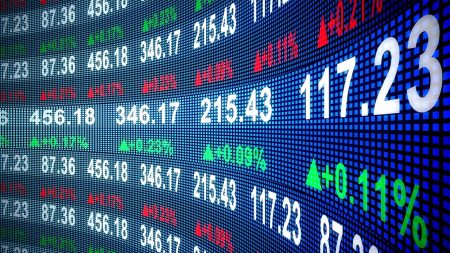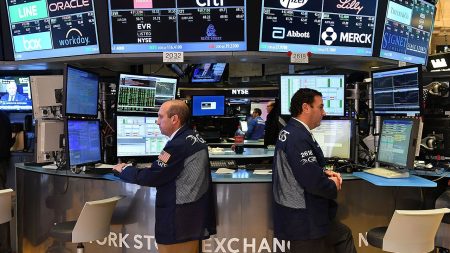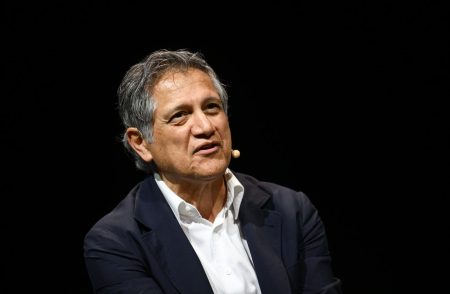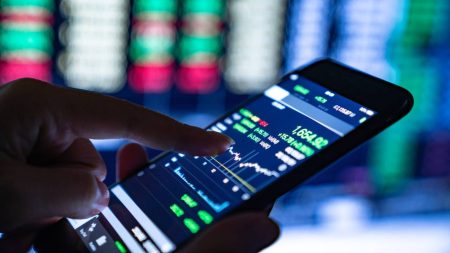With JPMorgan leading the list, the United States has widened its lead as home to the world’s biggest companies according to Forbes’ annual Global 2000 ranking. Strong U.S. markets should be thanked.
By Hank Tucker, Forbes Staff
While Americans continue to grapple with high prices at the grocery store and the highest mortgage rates in more than two decades, the world’s largest economy is still proving to be as resilient as ever.
Whether the United States is simply the “cleanest dirty shirt” at a tenuous time for the entire globe or a leader at the forefront of an AI-fueled revolution, investors are increasingly keeping their focus here. There are 621 U.S.-based firms on Forbes’ 22nd annual Global 2000 list ranking the largest publicly traded companies in the world, up from 611 last year, its highest point since 2007 before the Financial Crisis. Meanwhile, the number of companies calling China or Hong Kong home shrank to 324 from 346 last year.
NVIDIA’S CLIMB
Nvidia didn’t crack the top 1,000 of the Global 2000 until 2017, but is now on the precipice of the top 100.
The Global 2000 ranks companies by sales, profit, assets and market value, with all four variables given equal weights. This year’s list accounts for the latest 12 months of data available through May 17. The 2,000 companies on the list collectively account for $88 trillion in market value, a 19% jump in market value, and posted slight upticks to a record $51.7 trillion in revenue, $4.5 trillion in profits and $238 trillion in assets.
More than $4 trillion of those assets belong to JPMorgan Chase, which held the No. 1 spot on the list for the second straight year. America’s largest bank posted a record $50 billion in net income and cleared $500 billion in market cap for the first time, growing stronger through last year’s regional banking crisis by bringing in more customer deposits and acquiring First Republic Bank out of insolvency.
“In spite of the unsettling landscape, including last year’s regional bank turmoil, the U.S. economy continues to be resilient, with consumers still spending, and the markets currently expect a soft landing,” CEO Jamie Dimon wrote in his annual letter to shareholders. “By purchasing First Republic Bank, we brought much-needed stability to the U.S. banking system while allowing us to give a new, secure home to over half a million First Republic customers.”
Warren Buffett’s Berkshire Hathaway returned to No. 2 on the list after sinking to 338th last year due to unrealized losses in its investment portfolio causing a negative net income on paper, and the market’s rebound also helped Amazon climb back into the top 10 at No. 6. Six of the top 10 companies and 14 of the top 25 are based in the U.S.
While the S&P 500 was surging to record highs in the last year, the Shanghai Composite Index tracking Chinese stocks and Hong Kong’s Hang Seng Index both declined for the second straight year in 2023. China is still embroiled in a real estate crisis precipitated by the collapse of Evergrande Group in 2021.
GLOBAL IMBALANCE
The U.S. is keeping China at bay, but other emerging markets like India are getting stronger.
China’s southern neighbor is faring better, as India put 71 companies on the Global 2000, up from 55 last year to move past the United Kingdom and South Korea into the top five most represented countries. Its largest company, billionaire Mukesh Ambani’s conglomerate Reliance Industries, slotted in at No. 49 with $109 billion in 12-month sales and a $233 billion market cap. Life Insurance Corp. of India, which just went public in 2022 and debuted on the list last year at No. 362, surged up to 70th this year, with its profit increasing ninefold to $4.9 billion and its stock rising by 70%.
Other notable jumps in the ranks include telecom giant AT&T. The company, which operated as a monopoly for much of the 20th century and whose origins date back nearly 150 years, fell to rank 370th last year due to a $23.5 billion net loss it booked on asset write-offs in the fourth quarter of 2022 but rebounded to No. 37 thanks to a return to profitability, despite a stagnant share price.
Going the other direction, Pfizer, which is even older than AT&T, founded in 1849, is the most prominent name among a slew of pharmaceutical firms that plunged in the rankings. After it was one of the heroes of the pandemic, vaccinating billions of people around the world, Pfizer has struggled in the post-Covid world. Its 12-month sales through the first quarter of this year cratered 41% to $55 billion compared with the prior year, and it has been slightly unprofitable in the last 12 months after dipping into the red in the third and fourth quarters of 2023. CEO Albert Bourla acknowledged that Pfizer missed its internal projections in its year-end earnings call, and its stock price is lower than it was even when the pandemic began. It fell to No. 436 from No. 39 on this year’s Global 2000.
MOVERS AND SHAKERS
Here are the companies that made the five biggest jumps into the top 100 and five biggest drops out of the top 100.
Pfizer’s peer in the Covid vaccine business, Moderna, suffered an even more precipitous drop. Its first-quarter sales this year were a mere $167 million, a 91% decline from its $1.9 billion quarter a year ago. Over a 12-month span, Moderna’s $5.1 billion in revenue is down 66%, and it recorded $6 billion in net losses. Its Global 2000 rank dropped more than 1,000 spots from No. 462 to No. 1,468. Still, the promise of new products in the pipeline including an RSV vaccine and a Covid-flu combination shot has helped its stock rebound 31% this year, though it’s still 67% lower than its 2021 peak.
While drugs and biotech companies were the hardest-hit sector, many of the top performers were concentrated in financial services, insurance and semiconductors. Nvidia, the darling of the stock market for the last two years thanks to its dominance in making graphics processing units for AI applications, climbed more than 100 spots to 110th, and other major chipmakers like Broadcom and Advanced Micro Devices also jumped significantly.
SEMICONDUCTOR SURGES
Chipmaking has been one of the hottest industries of the year as companies rush to build new AI applications.
In a quiet year for major IPOs, there are relatively few newcomers to the list, but one company debuting at No. 856 on the shoulders of the AI boom is Super Micro Computer, whose stock is up more than 800% since the start of 2023. The San Jose-based company which sells servers and storage for data centers now has a $52 billion market cap, with $1 billion in last-12-month profit on $12 billion in sales, nearly doubling in a year. The highest-ranked newcomer at No. 680 is GE Vernova, a spin-off of General Electric’s energy businesses that started trading this May.
MORE FROM FORBES
Read the full article here












